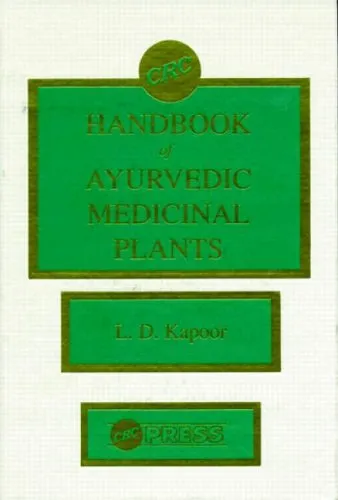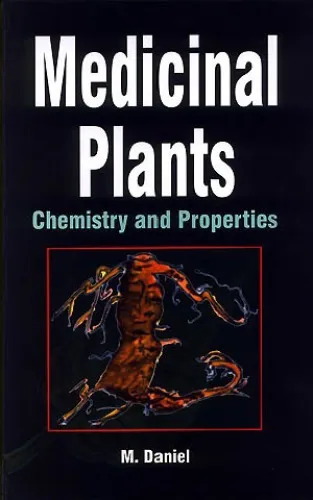CRC Handbook of Ayurvedic Medicinal Plants
4.3
Reviews from our users

You Can Ask your questions from this book's AI after Login
Each download or ask from book AI costs 2 points. To earn more free points, please visit the Points Guide Page and complete some valuable actions.Related Refrences:
Introduction to the CRC Handbook of Ayurvedic Medicinal Plants
The CRC Handbook of Ayurvedic Medicinal Plants by L. D. Kapoor is a comprehensive and meticulously researched guide to the rich repository of Ayurveda's healing traditions. This work serves as an authoritative reference for scholars, practitioners, and enthusiasts of Ayurvedic medicine, offering insights into the practical and cultural significance of India's centuries-old medical heritage. With detailed descriptions of plant species, their medicinal uses, and chemical compositions, the book bridges the gap between traditional Ayurvedic wisdom and modern scientific exploration.
Summary of the Book
The CRC Handbook of Ayurvedic Medicinal Plants is a meticulous collection of information on hundreds of plants used in Ayurvedic medicine. The book offers detailed botanical descriptions, chemical constituents, pharmacological properties, and traditional uses of these plants. It highlights the therapeutic potential of nature and how ancient Indian texts have documented remedies for treating a wide range of human ailments.
This handbook stands out as it synthesizes the knowledge enshrined in classical Ayurvedic texts with modern scientific discoveries. Kapoor brings out the relevance of ancient plant-based therapies in contemporary medicine, making this book an invaluable tool for researchers and healthcare professionals. Each plant entry emphasizes the name (in Sanskrit, English, and Latin), its habitat, traditional uses, as well as the dosage and preparation methods. The technical precision and structured format make it both a scholarly asset and an easy-to-follow guide for any reader.
Covering topics like anti-inflammatory herbs, natural detoxifiers, adaptogens, and potent healing botanicals, the book provides critical insights into how Ayurveda uses medicinal plants to address complex health imbalances. Furthermore, its organization allows readers to navigate effortlessly through the wealth of information, whether they are interested in Ayurveda, ethnobotany, or pharmacology.
Key Takeaways
- Comprehensive data on over 200 Ayurvedic medicinal plants.
- Botanical descriptions aligned with traditional and modern nomenclature.
- Details on the chemical composition and pharmacological properties of herbs.
- Guidelines for formulating and applying herbal remedies in Ayurvedic practices.
- Significance of ancient herbal knowledge in modern scientific research.
Famous Quotes from the Book
"In Ayurveda, plants are not merely sources of medicine—they are seen as gifts of nature, each offering unique energies to restore balance and harmony within the body."
"To understand the true power of medicinal plants is to explore the synergy between ancient knowledge and modern scientific discovery."
"Ayurvedic medicine views health not only as a cure for diseases but as a state of inner and outer renewal provided by natural, plant-based interventions."
Why This Book Matters
The CRC Handbook of Ayurvedic Medicinal Plants holds immense significance for both the fields of Ayurveda and plant-based medicine. In a time when the world is recognizing the adverse effects of synthetic drugs, this book highlights the value of herbal remedies sourced directly from nature. By explaining how these remedies have been skillfully used for centuries, the book brings credibility to Ayurveda and promotes its role as a serious discipline in global healthcare.
Additionally, the handbook is a fundamental resource for researchers investigating plant-derived bioactive compounds. It provides scientific insights that can inspire novel drug development initiatives while preserving the ecological balance of our planet. Furthermore, it equips modern practitioners with the wisdom needed to integrate natural alternative therapies within contemporary healthcare systems.
By situating Ayurveda in the broader context of ethnopharmacology and phytochemistry, this book facilitates a better understanding of cultural and scientific perspectives. Its accessibility and depth make it a must-have for everyone interested in the healing strength of plants—be they Ayurvedic doctors, herbalists, academics, or environmentally conscious readers.
Ultimately, this handbook is more than a mere catalog of Ayurvedic plants—it is a testament to the timeless wisdom of nature and a call to embrace plant-based therapeutic practices for long-term health and harmony.
Free Direct Download
Get Free Access to Download this and other Thousands of Books (Join Now)
For read this book you need PDF Reader Software like Foxit Reader



